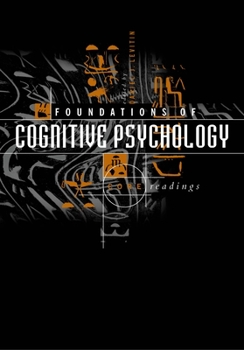Foundations of Cognitive Psychology: Core Readings
Select Format
Select Condition 
Book Overview
Scientists from many disciplines, including physics, chemistry, biology, and neuroscience, contribute to the study of cognition. Cognitive psychology, the science of the human mind and of how people process information, is at the core of empirical investigations into the nature of mind and thought. This anthology is based on the assumption that cognitive psychology is at heart empirical philosophy. Many of the core questions about thought, language,...
Format:Paperback
Language:English
ISBN:0262621592
ISBN13:9780262621595
Release Date:September 2002
Publisher:Bradford Book
Length:878 Pages
Weight:3.34 lbs.
Dimensions:1.6" x 7.0" x 10.2"
Age Range:18 years and up
Grade Range:Postsecondary and higher
Customer Reviews
4 ratings
Interesting collection of articles
Published by Thriftbooks.com User , 18 years ago
As defined by the editor of this book, cognitive psychology is a field that studies the information processing capabilities of the human mind. Having its origin in an actual college classroom, the book does give a good overview of some of the developments in cognitive psychology and can be read profitably by anyone interested in the field. Since it is targeted towards undergraduate students in cognitive psychology, articles are included that introduce the field both from an historical and a philosophical viewpoint. Those readers interested in artificial intelligence will also find many of the articles of interest, especially those that address the actual cognitive processes in the brain that are involved in problem solving or goal-setting. Philosophical argumentation on the `mind-body problem' occupies a portion of the book, but the space devoted to such speculative matters is refreshingly kept at a minimum. It is clear throughout the book that the editor wants to keep the mind-brain distinction intact. One of the more interesting articles in this collection is the one by K.A. Ericsson and J. Smith on the empirical study of expertise. The identification and study of expertise is important not only from the standpoint of cognitive psychology but also in artificial intelligence, where it is becoming more important to identify when a machine has expertise in more than one domain. The authors have given the reader an overview of what they call the `original expertise approach'. Their goal is to first characterize expertise in a domain-independent way and then discuss chess as an example. Crucial to any study of expertise is being able to distinguish between outstanding individuals in a domain from those that are not. The authors also want to distinguish "stable" achievement from that which might be accidental or happen only once. But most importantly, they point to the need for a `control group' who, given the same opportunities to achieve, could be compared with the achievements of an individual deemed to be unusually talented. The author's `original expertise approach' tries to define conditions under which one can study critical performance and find out which of its components are responsible for making it superior performance. It is necessary in their approach to design a set of tasks in a given domain that illustrate superior performance and to be able to bring out this performance in actual laboratory conditions. This approach is therefore difficult to carry out, since the conditions in real life needed for superior performance are hard to replicate in the laboratory. Their discussion of chess performance is helpful in this light but it still leaves doubt as to why superior chess players can perform as well as they do and the exact nature of the cognitive processes that they use to attain superior performance in chess. Of course, one cannot observe directly these cognitive processes, and the authors recognize this. However, they argue that us
Levitin a Genius
Published by Thriftbooks.com User , 21 years ago
Levitin, professor of psychology at McGill university has managed to gather the work of some of the best minds in cognitive psychology together in one book. A plethora of interesting and informative essays, this book is a must read for anyone who every wondered: who am I, and why do I think the way I do?
very informative book!
Published by Thriftbooks.com User , 21 years ago
This book is great. It is clear and easy to understand. It is making this topic so much more enjoyable!
Student Review
Published by Thriftbooks.com User , 21 years ago
Far from being like the old, dry, boring Psychology books of yore, "Foundations of Cognitive Psychology", though a required text for the Cognitive Psychology students at McGill, is able to hold its own and rise above the competition. A collection of articles, ranging from the philosophical "Where Am I?" by D. Dennett to the downright scientific (for example "Features and Objects in Visual Processing" by A. Treisman), the book gives the reader and the student a sample of the many possible views and stances regarding Cognition. According to Webster's dictionary, Cognitive Psychology is defined as "relating to, or being conscious of mental activity (as thinking, remembering, learning or using language)." Levitin's "Foundations" proves that Cognition is much more complicated than just a simple definition in the dictionary. Students and interested readers will benefit from this text.





